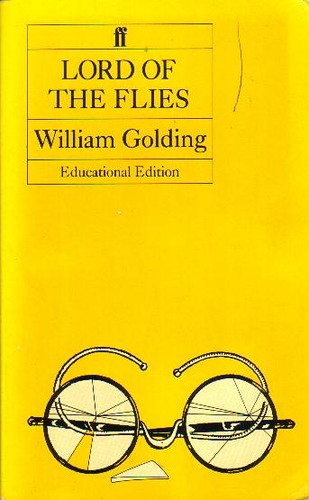My favorite book. That's a tough one which I probably wouldn't have been able to answer until just recently when I read „Lord of the Flies“ by William Golding. Oh. My. God. Such a fantastic book! I already wrote a blog post about it, so go and check out that one. The following post is probably going to be more spoileresque, so if you don't want to be spoiled, stop reading.
To summarize the plot: A bunch of children, who are evacuated from a war, land on a deserted island. While at the beginning they are very civilized (e.g. elect a leader in a democratic way) and all work together to build a signal fire, things quickly get worse, when they start fighting because some people don't fulfill their duties, as they want to hunt rather then keep the fire burning. It turns into a conflict between two boys (Ralph and Jack) and with the help of group dynamics soon two rival groups are formed. After killing one boy by accident and one intentionally it ends with an all-against-one situation. The whole island is set on fire and the group hunts down Ralph, the former leader of the group in order to kill him. Surprisingly he is rescued by a naval officer. They saw the fire and came to rescue the kids (See what he did there? They are rescued by the military, which is involved in a war. So even though Ralph is rescued from immediate danger, the world out there contains the same danger, just on a bigger scale).
I know, this story on it's own doesn't sound too exciting. But it is incredibly well written and he uses such incredible good metaphors, which capture so much truth. For example the Conch. The Conch is some kind of seashell, which Ralph (the first leader) and Piggy (the nerdy fat kid) find in the beginning of the story. When blown it makes a sound that can be heard all over the island. Ralph uses it to gather all the children from the island. They later establish that during an assembly the one holding the Conch, has the right to speak while everyone else is supposed to listen. When people don't pay attention to that rule (which especially Jack, the latter leader, and his hunters never really do), Piggy get's really upset and just says „I got the Conch!“ over and over again. Later, when Ralph and Piggy go to Jack's Camp (after the group has split up), Piggy is killed by a huge rock that is thrown at him, and the Conch bursts into smithereens. This is the final end of civilization (represented by the Conch) and reason (represented by Piggy). And how could you find a better metaphor for civilization then the a Conch? It's beautiful and fragile. Everyone admires it at first, it's what ties the boys together at first (it's a sign for the assembly, for the rules they establish, for a democraticly elected leader). And then it bursts – so easily. Which is exactly what this book is about! But I already talked about this in my last post on Lord of the Flies. Gosh, I could keep on talking forever. Well, let's just talk about one more thing: The Lord of the Flies, which gave the novel its name and which is, by the way, a translation for Belzebub, is (in the book) the head of a killed wild sow, stuck on a stick and left somewhere on the island as a sacrifice for „the beast“, which the boys fear. It starts to rot and more and more flies are attracted to it, thus the name - it transforms from an innocent sow, suckling its piglets, to a grotesque, disgusting, scary thing, just as the the kids „rot“ and transform, most of them out of fear, too. So both (the transformation of the kids and the lord of the flies) is created out of fear and develops a life of it's own - something nobody really wanted to happen - but at the same time, it's man-made. It's not happening without things people do. It's not some evil power seducing the innocent kids, but it's something they all have inside of them that even starts the whole process.
… congratulations, you are at the end of this post. Sorry for geeking out about this book ;)

It doesn't really sound like a book I could be that enthusiastic about but if you like it that much there has to be something. I'll probably read it. Well. Later. After finishing this lovely book about GDR-uniforms. Which I'll probably never do during my studies. But I'll try.
AntwortenLöschenMy former english teacher used to recommend this book quite often - not with all the details you threw around here but he shared your enthusiasm.
AntwortenLöschenAs for myself, I once thought about reading it but stopped after a few pages. This MAY be due to the crappy translation, but I wouldn't think it was a book I'd enjoy to read. But maybe, when I got the time, I'll try reading it in the original version.